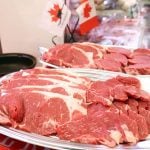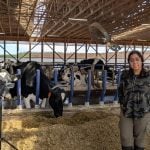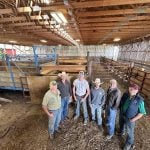Western Canadian feeder cattle prices experienced a week-over-week decline of $12-$15 on average, with fleshier unweaned calves trading down $20-$25. Major feedlot operators reined in buying interest across the Prairies as fed cattle and wholesale beef prices remain under pressure.
Feeding margins continue to deteriorate beyond pain thresholds and the backlog of market-ready feedlot supplies and growing carcass weights are serious concerns. Commercial feedlot hedges at higher levels have run their course and future feeder cattle purchases need to be profitable, given the deferred price structure. Cow-calf producers holding back on purchases, in hopes of some recovery, were severely punished as if the market was waiting to play the trump hand. Sellers were in shock and awe becoming aware how fast market conditions can change from only two months ago.
Read Also

China buys U.S. soybean cargoes ahead of Trump-Xi meet, sources say
China’s state-owned COFCO bought three U.S. soybean cargoes, two trade sources said, the country’s first purchases from this year’s U.S. harvest, shortly before a summit of leaders Donald Trump and Xi Jinping.
Larger-frame Angus-cross steers averaging 850 lbs. dropped under the magical $2 per pound, trading from $184 to $189 in central Alberta. In southern Alberta, 550-pound well framed medium-flesh semi-weaned steers were trading from $245 to $250, while heifers of similar weight were selling from $205 to $210. The markets in eastern Saskatchewan and Manitoba also fell sharply, coming in line with Alberta values and at times trading at a discount. U.S. buyers were on the sidelines, with average prices south of the border dropping US$15-$20 from week-ago levels. Winnipeg values for higher-quality 700-lb. steers were in the range of $210-$214.
The Canadian dollar is due for a bounce, which will weigh on fed and feeder cattle prices. January and February are also periods of seasonal low beef demand and with growing beef supplies, the fed and feeder markets are expected to remain under pressure.
Live and feeder cattle futures are now at their lowest levels since July 2013, so once packers start to clean up market-ready supplies, we should start to see some stability in the market. However, this may take a month or two and, as we used to say on the trading floor, the market can remain irrational longer than one can hold onto a position.
— Jerry Klassen is manager of the Canadian office for Swiss-based grain trader GAP SA Grains and Produits. He is also president and founder of Resilient Capital, which specializes in proprietary commodity futures trading and commodity market analysis. Jerry owns farmland in Manitoba and Saskatchewan but grew up on a mixed farm/feedlot operation in southern Alberta, which keeps him close to the grassroots level of grain and cattle production. Jerry is a graduate of the University of Alberta. He can be reached at 204-504-8339.












